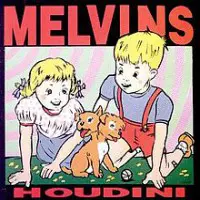The Melvins' major label debut Houdini is proof that major labels aren't always giant, evil, inferring creeps. After the explosion that was Nirvana, major labels went scampering to pull up as many alt-rock acts as they could. At Kurt Cobain's insistence, Atlantic signed the Melvins to a three-album deal, partially based off the fact that the Melvins taught Nirvana how to play their instruments and that Nirvana used to roadie for the weird trio. Because of those factors, the Melvins were able to hatch a financially rewarding deal that included zero label artistic control.
Despite all that, Houdini is unusual in the Melvins' catalogue for being so accessible. On previous albums Bullhead and Lysol, they engaged in near ten-minute drone and feedback affairs. After the major label deal, they released the soundscape Pigs of the Roman Empire and the hourlong sound clash The Colossus of Destiny.
But quite inconspicuously, Houdini opened with "Hooch," which by Melvins standards is pretty normal. As always, the song was driven by Dale Crover's powerful, tribal style strumming and guitarist Buzz Osborne's, thick, sludgy, but energetic guitar. Meanwhile, Osborne howled over top in his heavy metal-meets punk cadence, spewing ambiguous lyrics that had meaning to him, but are nearly impossible to decipher. This style continued for nearly the whole album, with 11 of the album's 13 tracks fitting into a nice, neat 2:45-4:45 box.
Still, despite the conventional appearance of these songs, the band did get weird. "Night Goat" ended with a screeching, off-kilter guitar solo that sounds like rusty hinges. Many of the songs lacked traditional structure; "Lizzy" experiments in quite/loud dynamics to the degree of Queen. But, above all, these songs rocked, in part because Crover and Osborne weren't afraid to kick it out, in contrast to their contemporaries, many who were wrongfully labeled as "grunge."
But of course, it wouldn't have been a true Melvins record without at least some weirdness. The album closed with "Spread Eagle Beagle," a ten-minute long massive drum jam instrumental that may be the soundtrack to bestiality. They covered Kiss' "Going Blind," a near comical song about a 93 year old having an affair with a 16 year old, at a time when Kiss were very uncool. And, in note to their appreciation of older music, "Sky Pup" snatched some of the affections of lounge-jazz, but of course, warps it into something that seems menacing, but not for any one particular reason.
Interestingly, the credits to Houdini are wonderfully inaccurate. Though Lori Black, purported daughter of Shirley Temple, is listed as the bassist, Osborne has stated that she doesn't appear the recording at all, and that he and Crover actually handled all of the album's duties, making this perhaps the only album where the Melvins appeared as a duo. (Osborne also stated that he doesn't actually think that Lori Black is Shirley Temple's daughter, based off the fact that she was in the band for several years and that he dated her, yet never once met Shirley Temple.) Similarly, Kurt Cobain is listed on the credits as producer. However, by the time work on the album began, Cobain was deep into his drug and family problems, and was fired by the band for being inadequate in the studio, though it is unclear if some of his work remains on the album.
Because Houdini was perhaps the most accessible Melvins album, it was often the gateway to many of the band's fans. Although Osborne once stated that "it's not one of my favorites, but I like a lot of the songs on it," the band clearly had some affinity for it, releasing no less than two official live renditions of it. Notably, though, both live releases were significantly altered and weirder than their studio counterpart. Likewise, the following two major label releases, Prick and Stoner Witch, were considerably more esoteric than Houdini.
Still, Houdini represents what good can come of a major label. The band was pleased with the results and have since stated that if offered the same deal as before by a major label, they would take the deal. Likewise, while Houdini was not a windfall for Atlantic, it did debut at no. 29 on the Billboard Heatseekers chart. It could be argued that Houdini was the financial boost that gave the Melvins just enough encouragement to stick it out to the present day, learning on how to live with a fair, but not monumental, amount of cash while continuing to grow artistically. But, as with so many puzzles that surround the Melvins, the true story will never be known.
